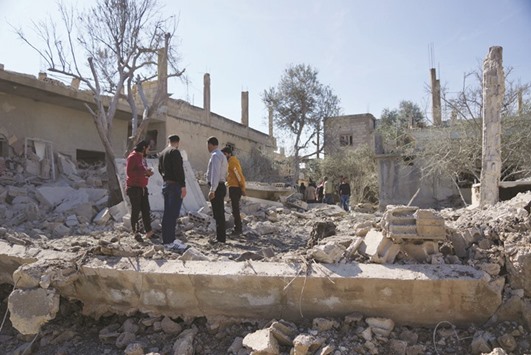Major powers yesterday agreed to a pause in combat in Syria, but Russia pressed on with bombing in support of its ally President Bashar al-Assad, who vowed to fight until he regained full control of the country.
Although billed as a potential breakthrough, the “cessation of hostilities” agreement does not take effect for a week, at a time when the Assad regime is poised to make advances with the backing of Russian air power.
If implemented, the deal hammered out at five hours of late night talks in Munich would allow humanitarian aid to reach besieged towns. It was described by the countries that took part as a rare diplomatic success in a conflict that has fractured the Middle East, killed at least 250,000 people, made 11mn homeless and sent hundreds of thousands fleeing into Europe.
But several Western countries said there was no hope for progress without a halt to the Russian bombing, which seems to have turned the balance of power in favour of Assad.
US Secretary of State John Kerry said that if the peace plan fails, more foreign troops could enter the conflict.
“If the Assad regime does not live up to its responsibilities and if the Iranians and the Russians do not hold Assad to the promises that they have made...then the international community obviously is not going to sit there like fools and watch this. There will be an increase of activity to put greater pressure on them,” Kerry, who was in Munich, told Dubai-based Orient TV.
“There is a possibility there will be additional ground troops.”
US President Barack Obama has ruled out sending US ground troops to Syria, but Saudi Arabia this month offered ground forces to fight Islamic State.
Rebels said the town of Tal Rifaat in northern Aleppo province was the target of intensive bombing by Russian planes yesterday morning. The British-based Syrian Observatory for Human Rights, a monitoring body, said warplanes believed to be Russian also attacked towns in northern Homs.
The news agency AFP quoted Assad as saying he would “continue to fight terrorism” while talks took place. He would retake the entire country, although this could take a long time, he said.
Another week of fighting would give the Damascus government and its Russian, Lebanese and Iranian allies time to press on with the encirclement of Aleppo, Syria’s biggest city before the war.
The cessation of hostilities agreement falls short of a formal ceasefire, since it was not signed by the main warring parties - the opposition and government forces. Implementing it will now be the key, Kerry said: “What we need to see in the next few days are actions on the ground.”
Two Syrian rebel commanders told Reuters they had been sent “excellent quantities” of ground-to-ground Grad missiles by foreign backers in recent days to help confront the Russian-backed offensive.
Russia suggested it might not stop its air strikes, even when the cessation of hostilities takes effect in a week.
Foreign Minister Sergei Lavrov said Moscow would not stop bombing fighters from Islamic State and a rebel group called the Nusra Front, neither of which were covered by the cessation deal: “Our airspace forces will continue working against these organisations,” he said.
Moscow has always said that those two groups are the principal targets of its air campaign. Western countries say Russia has in fact been mostly attacking other insurgent groups.
Turkey’s foreign minister yesterday accused Russia of targeting schools and hospitals in Syria.
Nato secretary general Jens Stoltenberg said Moscow must halt strikes on insurgents other than Islamic State for any peace deal to work.

People inspecting the damage after air strikes by pro-government forces in the rebel-held town of Dael, in Deraa Governorate, Syria yesterday.
